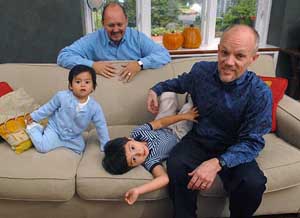national
Companies see benefits of being gay-friendly
Domestic partner insurance and other perks carry weight with prospective employees
Published Thursday, 12-Oct-2006 in issue 981
Because of an increasingly common policy at U.S. companies, Vivienne Armstrong can choose from two different plans when she considers her health insurance: the one offered by her employer and one offered by her partner’s.
Armstrong, a registered nurse, gets her health coverage through the defense firm Raytheon Co., which offers domestic partner benefits to her partner, Louise Young. Young, a senior software engineer in the Plano, Texas, office, said Armstrong chose Raytheon’s plan simply because it has stronger benefits.
Young, a lesbian activist, said she is encouraged by signs of the growth of gay-friendly corporate policies within her industry and in corporate America. The Human Rights Campaign (HRC) reports that gay-friendly policies are being added at a greater number of companies, where they are a draw to prospective employees, gay and straight.
“Some of our competitors are starting to emulate our good workplace policies,” Young said.
Raytheon was touted as the first in its industry to earn a perfect score from the HRC in 2005. To earn a perfect score, companies must offer domestic partners health and other wellness benefits, enact nondiscrimination policies for sexual orientation and gender identity, and support GLBT resource groups.
The HRC recently released its newest list tracking company policies on rights for GLBT employees, and this time it included three other defense contractors: Boeing Co., Honeywell International Inc. and Northrop Grumman Corp.
Companies in the automotive, pharmaceutical and consulting industries, as well as law firms, followed a similar pattern with more firms being added to the list.
HRC president Joe Solmonese attributes that to the growing sentiment among both gay and straight employees that companies should not only tolerate but encourage diversity of all kinds, including that of a sexual nature.
The HRC started its annual review in 2002. Since then, it has grown in visibility as an indicator of the type of culture a company cultivates, which is increasing in importance for gay and straight employees, Solmonese said.
“All of these things are motivated by what is good for business,” he said. “I hear from corporate leaders every week that they went after a very sought-after person and they hear the question of whether they have domestic partner benefits. For straight applicants, it’s a measure of the corporate culture.”
The report’s list – it grew to 138 from 101 – expands in part because more companies are becoming aware of its existence and deciding it is important to apply. Among the new additions in 2006: Anheuser-Busch Cos. Inc., Clear Channel Communications Inc., General Motors Corp., Google Inc., Morgan Stanley, Starwood Hotels & Resorts Worldwide and Visa International.
Like Raytheon, Ernst & Young claims the distinction of being first from its industry to make the list. Mike Syers, a partner at the accounting firm, attributes that in part to the early effort among employees. He was a founding member of bEYond, the firm’s GLBT employee group.
Chip Faught, associate director for national tax at Ernst & Young, and his partner, Nathan Monell, used the company’s financial assistance to help bring their adopted son and daughter from Guatemala in late May of last year. Faught received $5,000 per child in assistance, he said, and company policies gave him the flexibility to complete the adoption process – including three trips to Guatemala.
Syers said that gay-friendly policies, while good for employees, are also good for business.
“We have companies realizing they really can’t afford to exclude anyone,” he said. “Younger people are coming out of college and are out and open in their public lives; they’re not going to go back into the closet to begin their professional careers.”
At Merrill Lynch, the sense that gay-friendliness is important has actually translated into business opportunities. The firm’s Domestic Partner Financial Foundation helps couples plan their financial lives, and Merrill Lynch manages the endowments of a number of GLBT nonprofits.
Todd Sears, a senior financial adviser in Merrill Lynch’s global private client group, said corporate America – more than the general public – realizes the value of GLBT employees and consumers.
“Companies like Merrill Lynch understand that the LGBT community supports companies who support us, and will not do business with companies who do not,” Sears said.
|
|
Copyright © 2003-2025 Uptown Publications


